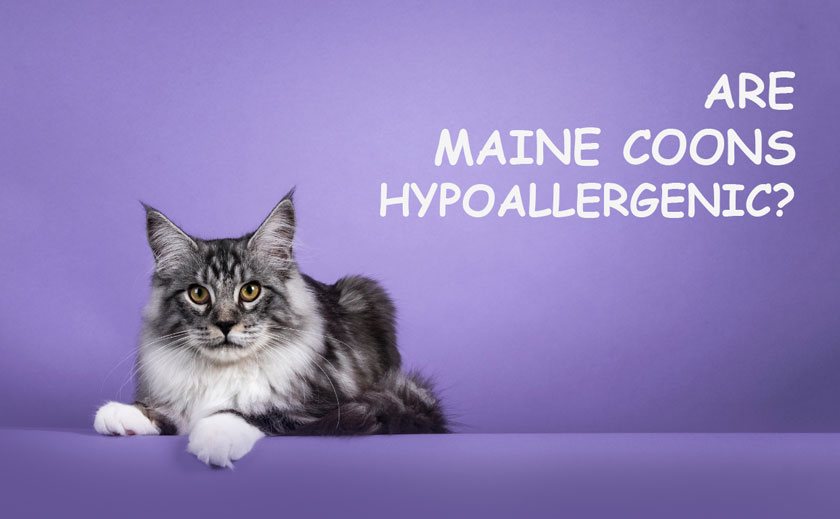Maine Coons are unfortunately not among the cats with particularly low allergens. Whether the acquisition is nevertheless possible, depends on some factors. What to consider in general with a Maine Coon cat allergy, we have compiled here.
Are Maine Coon Cats Hypoallergenic
For cat lovers, it is a bitter disappointment if they cannot keep a cat due to an allergy. There is no scientific evidence to support the claim that Maine Coons are hypoallergenic, but some people do find that they are less allergic to these cats than to other breeds. But even though some cat breeds are declared allergen-free, there is no guarantee that these breeds will not cause allergic reactions.
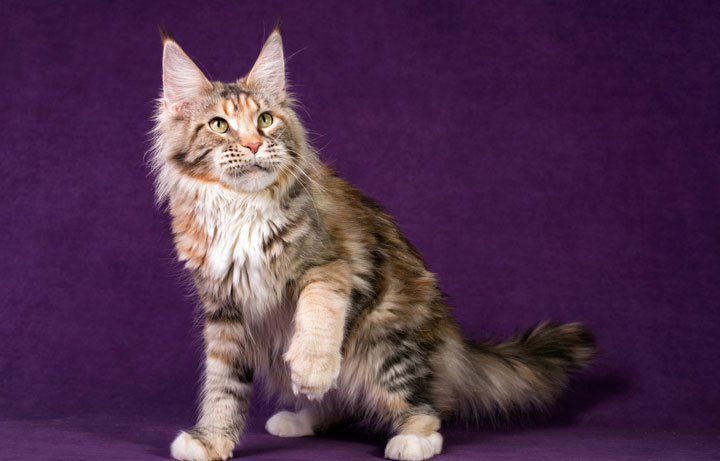
Latest Findings About Maine Coon Cat And Allergies
Before the research of Clare Bryant and her team, it was believed that cat dander could cause allergies. Accordingly, some breeds were labeled allergy friendly. The scientists from the University of Cambridge found out that it is not the hair that causes allergic reactions, but a certain protein. This protein is found in the dander, tears and saliva of cats. In addition, the protein has a very sticky property, so it can remain in the carpet or on furniture for a long time, sometimes even years. Based on these research results, attempts are now being made to develop a new drug that Maine Coon allergy sufferers can use in the future to combat allergic reactions.
What To Do If You Want To Keep A Maine Coon Despite Allergy
Medications, such as cetirizine or loratadine, are more for short-term solutions to the allergy problem. Moreover, these medicines should always be taken in consultation with the doctor. They curb the allergic symptoms, but the allergy remains. In the long term, desensitization can help. But there are limits to this method as well. An allergist will be able to tell if hypersensitization is possible.
If you are already a Maine Coon cat owner and do not want to give the animal away, you can take some measures to reduce the risk of allergy:
- For ease of cleaning, carpeting should be replaced with tile or another smooth flooring.
- The cat should not lie down on upholstered furniture, as the protein can be easily retained in the fabric.
- Since protein is also found in urine, the litter box must be kept clean. It should be emptied every day and filled with fresh litter. Those who already suffer from asthma should not even let the cat into the house. Some Maine Coon cats can live outside without any problems.
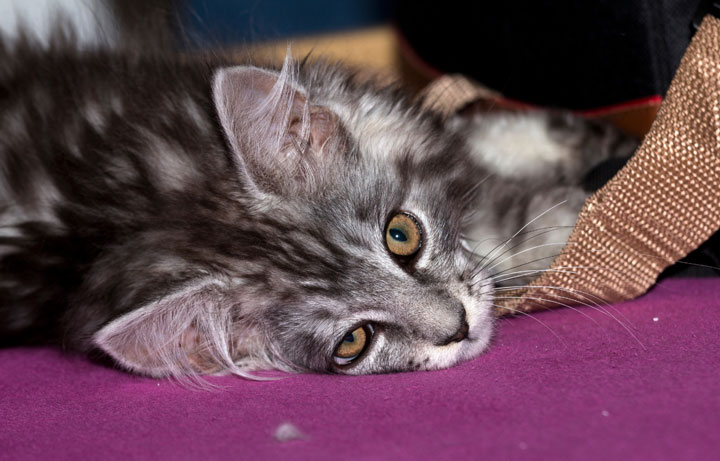
Maine Coon Cat Allergy Symptoms
In many cases, the first appearing symptoms of a Maine Coon cat allergy are assigned to completely different reasons. For example, there are signs of what seems to be a normal cold:
- you get a cold – the nose runs for god’s sake at first, and this can develop into powerful congestion in the respiratory tract.
- Strong sneezing frees – and everything together works just like a conventional cold – only that this will not say goodbye as fast as such and each of the mentioned reactions can be quite a first symptom of a Maine Coon allergy.
- Occurring skin itching and other skin irritations up to redness are also among the known symptoms of a cat allergy. One should carefully observe whether these intensify despite the use of soothing skin care products.
If, on the other hand, especially in the living area, the eyes show the first reactions such as itching, redness or uncontrollable tearing, without having previously handled known irritants, then it is time to contact a doctor, because with these factors you can assume that you may be allergic to the domestic cat.
Skin rashes and respiratory problems to asthma and various dangerous bronchial diseases, in general, can furthermore be among the worst symptoms of such a cat allergy. However, before a cat owner decides hastily to take any steps to separate his cat, he should consult an allergist, who can determine by means of special test procedures whether the symptoms are a cat allergy or another allergy.
Therapy and treatment
Hardly any Maine Coon cat owner is willing to part with his beloved cat “just” because his own immune system is going crazy. And so almost all those affected are undaunted in their search for proven or alternative ways to alleviate their own suffering and to remain happily united with the animal.
Probably the best known (and apparently the only) way to combat Maine Coon allergy is hyposensitization. In addition to a detailed preliminary discussion with your family doctor and allergist, you should also contact your health insurance company about the costs involved. There is the possibility that this makes the delivery of the cat a condition for the assumption of the treatment costs.
The best “Private Immediate Therapy” is to define clear areas of the home where the Maine Coon is not allowed to enter under any circumstances, such as the bedroom and the kitchen. Clothes should be put away out of reach of cats, and an indestructible vacuum cleaner with super suction power is definitely a “must have”, as it has to deal with cleaning floor coverings of all kinds, curtains and seating on a daily basis. Especially the area around the cat basket/toilet must be kept scrupulously clean.
The main allergen of Maine Coon allergies, the so-called Fel D, 1 is however hard to be eradicated, since it is to be found e.g. also outside of the dwelling in cat-free zones.
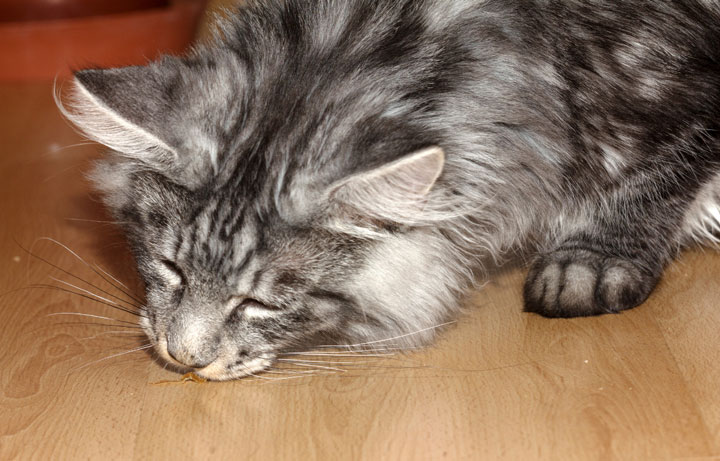
Desensitization or hyposensitization
A Maine Coon cat allergy can, like many allergies, trigger serious respiratory diseases such as bronchial asthma. If it is certain that one suffers from an allergy to cats, it is indispensable to take immediate countermeasures in order to protect one’s health. These can range from the well-planned removal of the Maine Coon, to its exclusion from a certain environment within the home, to a procedure that desensitizes the body and thus its immune system step by step under the supervision of a doctor.
The term desensitization is the old form of today’s term hyposensitization, also called hypo for short. This procedure is intended to reduce an excessively strong and thus actually non-vital reaction of the immune system to an allergen in the body. The aim is to prevent the body from immediately “freaking out” when it encounters the trigger of the dormant allergen, i.e. as soon as the cat appears, it breaks out in strong reactions that can become unpleasant, if not dangerous, for the person. This is to create a tolerance of the immune system to the allergen.
In hyposensitization (i.e. the original desensitization), the body is given the actual allergy-causing substances in an altered form. This is an allergy vaccination, so to speak. The purpose of this procedure is to slowly but continuously accustom the body’s immune system to the allergy trigger. In this way, it should be made to react less violently to the allergy-causing factor, such as a Maine Coon cat.
Normally, this form of desensitization of the immune system is carried out at regular intervals over a period of 3 years. The allergens are administered by injection, initially on a weekly basis and later only on a monthly basis. The effect of this procedure should be maintained for several years after completion.
This form of desensitization has been practiced by physicians for a long time and should in any case be performed by an experienced allergist. His special knowledge in the field of allergies is, in addition to his actual experience in therapy, a possibility that can lead to the fact that the discomfort of the cat allergy for the affected person at least so far recedes that normal life – and that perhaps even with Maine Coon – becomes possible again.
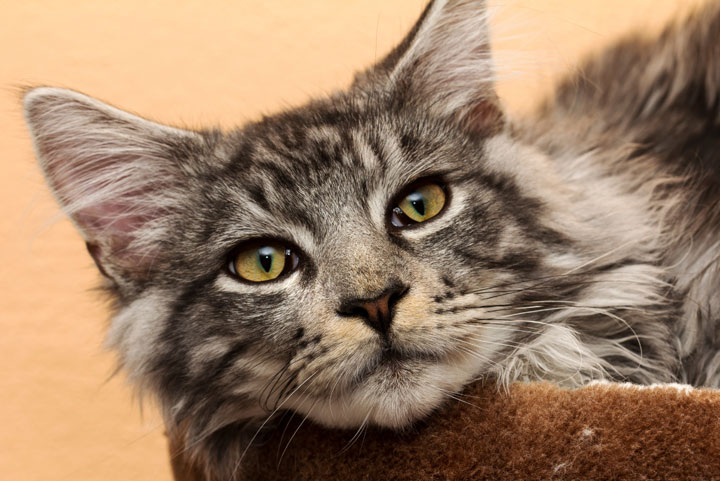
Which Cats Are Hypoallergenic?
Some breeds are said to be suitable for allergy sufferers. These include the naked Sphinx cat and the German Rex cat. It is said of the German Rex that most representatives of this breed do not produce the protein. However, there is no guarantee, because the production of the protein varies from individual to individual. Therefore, it can happen that a German Rex cat also causes allergies. Sometimes protein production increases with age and with sexual maturity. So it happens that an allergic person can cuddle with the young cat without an allergic reaction. As soon as this cat is sexually mature, allergy symptoms may appear.
Conclusion
So, Are Maine Coons Hypoallergenic? Unfortunately, they are not considered to be hypoallergenic cats, although some people with allergies may not experience symptoms when around them. All cats produce allergens, which are proteins that can cause an immune response in people who are allergic to them. The amount and type of allergen that Maine Coons produces can vary, and some people may be more allergic to one type of allergen than another.

